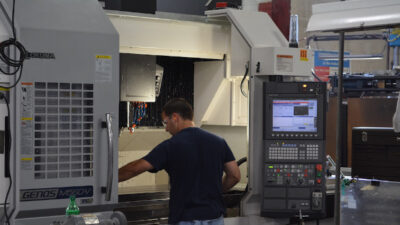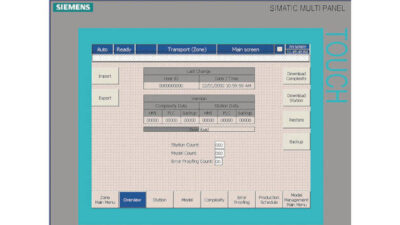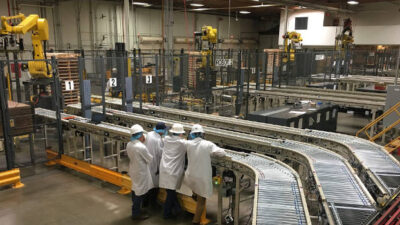It's been five years since the Control System Integrators Association (CSIA) began auditing its members to assess their compliance with the organization's Best Practices and Benchmarks Guidelines (Control Engineering, May 2001 and April 2002). To date, 80 of the CSIA's 230 members have passed their audits and earned the title "Certified Member" and the privilege of displaying the "CSIA Seal of ...
AT A GLANCE
CSIA certification explained
Industry acceptance
Benefits to end-users
Benefits to vendors
Benefits to integrators
It’s been five years since the Control System Integrators Association (CSIA) began auditing its members to assess their compliance with the organization’s Best Practices and Benchmarks Guidelines ( Control Engineering , May 2001 and April 2002). To date, 80 of the CSIA’s 230 members have passed their audits and earned the title “Certified Member” and the privilege of displaying the “CSIA Seal of Approval” logo (shown).CSIA certification—formerly “registration”—is intended to help end-users minimize the risk associated with selecting an integrator for an automation project. It is premised on the end-user’s need to assess a prospective integrator’s business practices, not just technical competence, sales volume, or years in business.
Towards that end, the certification audit looks at an integrator’s policies addressing management of finance, projects, quality, technical facets, human resources, business development, and other areas. The object is not to guarantee that the integrator’s policies exactly match CSIA’s benchmarks, but to assure an end-user that the integrator actually has such policies and has documented them thoroughly.
Progress to date
So has the CSIA’s Certified Member program fulfilled its mission thus far? Dan Wesley, supervisor of the Electrical and Instrumentation Department at Professional Engineering Consultants Inc., thinks so. His consulting-engineering firm recently retrofit an existing water treatment plant in the New Orleans area and hired CSIA-certified QDS Systems to work on the instrumentation and controls.
“I’m glad we required a CSIA-certified integrator for that project,” he notes. “What we get sometimes is an electrical contractor that does its own instrumentation even though it doesn’t really know what it’s doing. When [a system] doesn’t work, it doesn’t know what to do. Requiring certification eliminated the problem of contractors hooking up equipment without fully understanding instrumentation.”
However, Wesley recognizes a downside to requiring a certified integrator. “In a bid situation, it’s difficult to get qualified respondents. It limits the pool of available bidders too much, which is not good for competitive bidding. Contractors need to become more aware of certification.”
On the other hand, he notes, “the same thing happened with requiring UL-listed panels 10 years ago. Garage-shops all used UL-approved components, but had never been certified to build UL-approved panels. However, today most panel builders can meet that requirement, and someday, all the best integrators will be CSIA-certified.” After all, end-users do want their system integrators to be viable long-term businesses. (See the “System Integrator Selection Criteria” graphic.)
Vendors approve
Significantly greater enthusiasm for CSIA certification has come from the vendor community. GE Fanuc, National Instruments, Rockwell Automation, Schneider Electric, Siemens, and other vendor members of the CSIA have incorporated CSIA certification into the requirements for their respective system-integrator partnership programs.
Edwin Newell, national sales manager for Schneider Electric’s Strategic Accounts Organization, explains, “Our objective is to make the end-user happy. We feel that certified integrators are better able to accomplish that because they have the necessary processes and procedures in place. Since we are not a system integrator, we rely on referring business to them and we want the job done right because we’re recommending them. It only makes sense for us to recommend the very best—integrators who strive to continuously improve.”
End-users may not be widely aware of CSIA certification yet, but they do appreciate the underlying value. In a recent survey by the ARC Advisory Group, end-users cited long-term viability of a system integrator’s business as their primary selection criterion more often than references, post-implementation services, and low price.
Schneider Electric requires passage of the CSIA audit by all of its top-tier integrators, though other integrators are welcome to join Schneider’s other partnership programs with less-rigorous membership requirements. As Newell explains, “Hiring a CSIA Certified Member does give the end-user a safer, lower risk alternative to an uncertified integrator, but that’s not to say that those other integrators are unappealing to the end-user. CSIA certified members are simply more appealing.”
Jack Barber, manager of the National Instruments Alliance Partner Program, agrees. “Through CSIA certification, Alliance Partners can evaluate, improve, and validate their system integration practices, thereby increasing their professionalism and their competency in delivering solutions. The end result is higher customer confidence and satisfaction.”
He, too, requires CSIA certification for his top-tier integrators as part of individual reviews that considers revenue generation, business standards, and the relationship with National Instruments. “We utilize CSIA certification to help our evaluation of the quality of their system integration business practices.”
Newell adds, “CSIA certification was a perfect fit for what we wanted to do. It allows third-party administration of the certification process. Otherwise we going to have to re-create the same procedure, and that relieved us from having to do the audits ourselves.”
Not the only criteria
Rockwell Automation also uses CSIA certification as part of an overall evaluation of its top-tier system integrator partners. “CSIA certification assures sound business practices in the area of operational excellence—project management, quality control systems, human resources, financial practices, and so on,” says Chris Vaidean, manager of the Rockwell Automation system integrator programs. “Ultimately, when an integrator falls apart, it’s typically not because it didn’t have great talent, but because it ignored the business side of the equation, which is all the things CSIA looks at.”
However, Vaidean does not actually require CSIA certification for his top-tier integrators. “We strongly recommend passing the CSIA audit, but we need to recognize integrators run their own businesses. It’s also not fair to say that an integrator who has made a decision not to become CSIA-certified is not as good as someone who has invested in the certification.”
Instead, he performs his own evaluation that covers technical competence, customer satisfaction, sales, marketing, and areas of operational excellence, such as financials, quality control, and project management. “If they have CSIA certification, I automatically pass them on the operational excellence section of my evaluation. Operational excellence carries a lot of weight since companies scoring high in that area carry lower risk for our customers.
“Ironically, most clients’ project specifications don’t address these business issues,” he adds, “but if an integrator doesn’t have sound financial practices, [the integrator] can disappear in the middle of a project.” End-users also tend to undervalue sound project management guidelines. “A good project manager is worth his weight in gold since he’s going to both keep a client up-to-date on how the project is going and keep an engineer from slipping small features into the project that add unnecessary time. Poor project management often leads to projects that are late or way over budget.”
Integrators benefit too
Arguably, the most significant benefit of achieving CSIA certification is realized by the integrators themselves. Craig Pair, president of Control Technologies Inc. (CTI), recently hired a full-time employee whose sole function is to guide his company through the audit process successfully.
“As a company of under 10 people, we had systems—not necessarily formal—that covered audit basics,” says Pair. “They were designed through years of experience, and I felt that they were effective. Going through the audit program forced us to formalize systems. It has also forced reexamination of all systems, which has had the effect of getting everyone involved in examining and discussing the best and most efficient way to schedule, monitor, and perform a project.”
He sees less direct value for end-users. “The certification process is something my customers don’t really factor in. They have said to me that they want me to be profitable and to succeed because they rely on CTI. However, they think that a process like certification that equates to ‘ISO9000 or some-thing’ is OK but not really their concern.”
Ray Bachelor, president of CSIA-certified Bachelor Controls and chairman of the CSIA’s executive council, has even seen some resistance from clients who would prefer to forego some of the CSIA’s best practice procedures when time is short. “Sometimes they’ll want you to skip checkout, skip the kick-off meeting, and avoid change documentation. Structure and procedures can look like you’re wasting time.”
Still, he sees a distinct benefit for both parties in sticking to the audit standards. “Structure and good project management keep you and the client in sync and avoid conflicts and the emotion that goes with misunderstandings. Once a client sees a project delivery system that exemplifies good structure and a smooth startup, he won’t be satisfied with less.”
Bachelor’s employees also benefit from having well-established project management policies to go by. “They know what is expected of them, and they understand how they’re being measured. Our project management policies limit unreasonable expectations, save time, and reduce anxiety,” he says.
Smart business
Stan Prutz, president of QDS Systems agrees that writing down all business procedures and passing the CSIA audit has helped him organize his business better, especially since CSIA certification requires that he continue to improve procedures and pass the audit every three years. Doing so has also reduced the risk of losing his institutional knowledge with the departure of any one individual who had the only thorough understanding of how something was done.
Moreover, he found the whole process of joining the CSIA and passing the audit to be a beneficial learning experience. “We tried for years to find good consultants to help us run our business. What we found were general business consultants who didn’t really understand control system integration. When we found the CSIA, we met other people who already knew how to run their own system integration businesses successfully. Also, the CSIA’s third-party auditor, Exotek, has an unparalleled perspective on the industry based on dozens of audits. If they make a recommendation, you can be sure there’s a good reason for it, and it’s likely to work.”
Rockwell’s Vaidean sums up the merits of CSIA certification succinctly. “The most valuable service that the CSIA brings to the industry is to make sure that a lot of really smart technical people don’t forget the business side of their businesses.”



